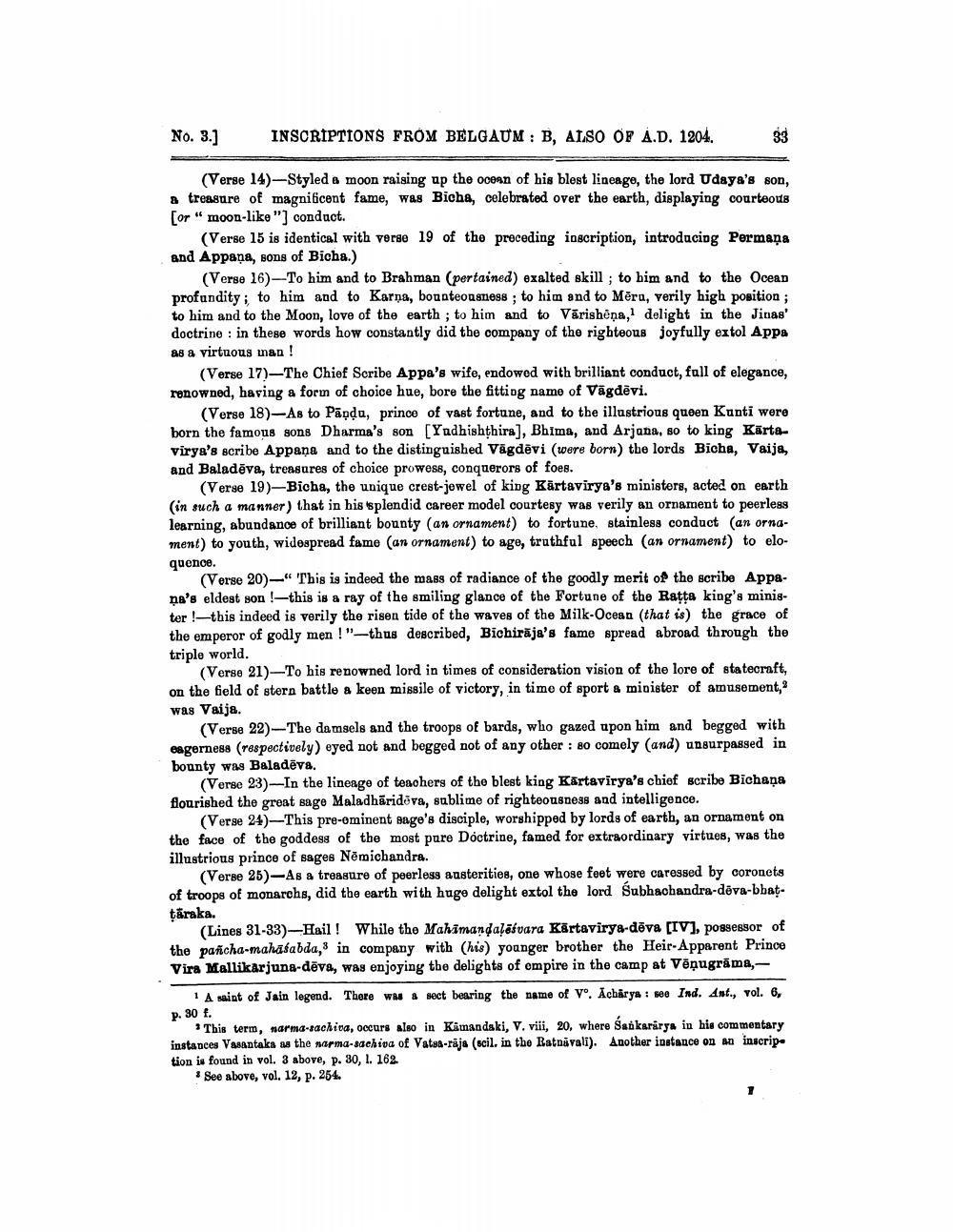________________
No. 3.]
INSCRIPTIONS FROM BELGAUM: B, ALSO OF A.D. 1204.
(Verse 14)-Styled a moon raising up the ocean of his blest lineage, the lord Udays's son, & treasure of magnificent fame, was Bicha, celebrated over the earth, displaying courteous [or" moon-like") conduct.
(Verse 15 is identical with verse 19 of the preceding inscription, introducing Permaņa and Appaņa, sons of Bicha.)
(Verse 16)- To him and to Brahman (pertained) exalted skill; to him and to the Ocean profundity; to him and to Karna, bounteousness; to him and to Mēra, verily high position ; to him and to the Moon, love of the earth; to him and to Vārishēna, delight in the Jinas' doctrine : in these words how constantly did the company of the righteous joyfully extol Appa as a virtuous man !
(Verse 17)-The Chief Scribe Appa's wife, endowed with brilliant conduct, full of elegance, renowned, having a form of choice hue, bore the fitting name of Vāgdēvi.
(Verse 18)-As to Pāņda, prince of vast fortune, and to the illustrious queen Kunti were born the famous sons Dharma's son [Yudhishthira), Bhima, and Arjana, so to king Kārtavirya's scribe Appana and to the distinguished Vägdēvi (were born) the lords Bicha, Vaija, and Baladēva, treasures of choice prowess, conquerors of foes.
(Verse 19)-Bicha, the unique crest-jewel of king Kārtavirya's ministers, acted on earth (in such a manner) that in his splendid career model courtesy was verily an ornament to peerless learning, abundance of brilliant bounty (an ornament) to fortune, stainless conduct an ornament) to youth, widespread fame (an ornament) to age, truthful speech (an ornament) to eloquenoe.
(Verse 20)-_This is indeed the mass of radiance of the goodly merit of the scribe Appana's eldest son !-this is a ray of the smiling glance of the Fortune of the Ratta king's minister this indeed is verily the risen tide of the waves of the Milk-Ocean (that is) the grace of the emperor of godly men !"-thus described, Bichirāja's fame spread abroad through the triple world.
(Verse 21)-To his renowned lord in times of consideration vision of the lore of statecraft, on the field of stern battle a keen missile of victory, in time of sport a minister of amusement, was Vaija.
(Verse 22)-The damsels and the troops of bards, who gazed upon him and begged with eagerness (respectively) eyed not and begged not of any other : 80 comely (and) unsurpassed in bounty was Baladēva.
(Verse 23)-In the lineage of teachers of the blest king Kärtavirya's chief scribe Bichana flourished the great sage Maladhārideva, sublime of righteousness and intelligence.
(Verse 24)-This pre-eminent sage's disciple, worshipped by lords of earth, an ornament on the face of the goddess of the most pure Doctrine, famed for extraordinary virtues, was the illustrious prince of sages Nēmichandra.
(Verse 25)-As a treagure of peerless austerities, one whose feet were caressed by coronets of troops of monarchs, did the earth with huge delight extol the lord Subhachandra-dėva-bbat. tāraka.
(Lines 31-33)--Hail! While the Mahimandalösuara Kartavirya-döva [IV], possessor of the pañcha-mahafabda,& in company with his younger brother the Heir. Apparent Prince Vira Mallikarjuna-dēva, was enjoying the delights of empire in the camp at Vēņugrāma,
A saint of Jain legend. There was a sect bearing the name of V. Acharya : seo Ind. Ant., vol. 6, p. 30 f.
This term, narma-rachida, occurs also in Kimandski, V. viii, 20, where sankarirya in his commentary instances Vasantaks as the narma-sgchipa of Vatsa-raja (scil. in the Ratnával). Another instance on an inscrip tion is found in vol. 3 above, p. 30, l. 162
* See above, vol. 12, p. 254.




